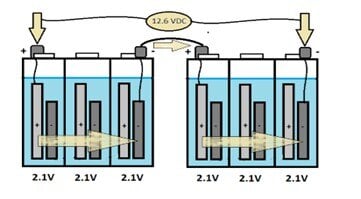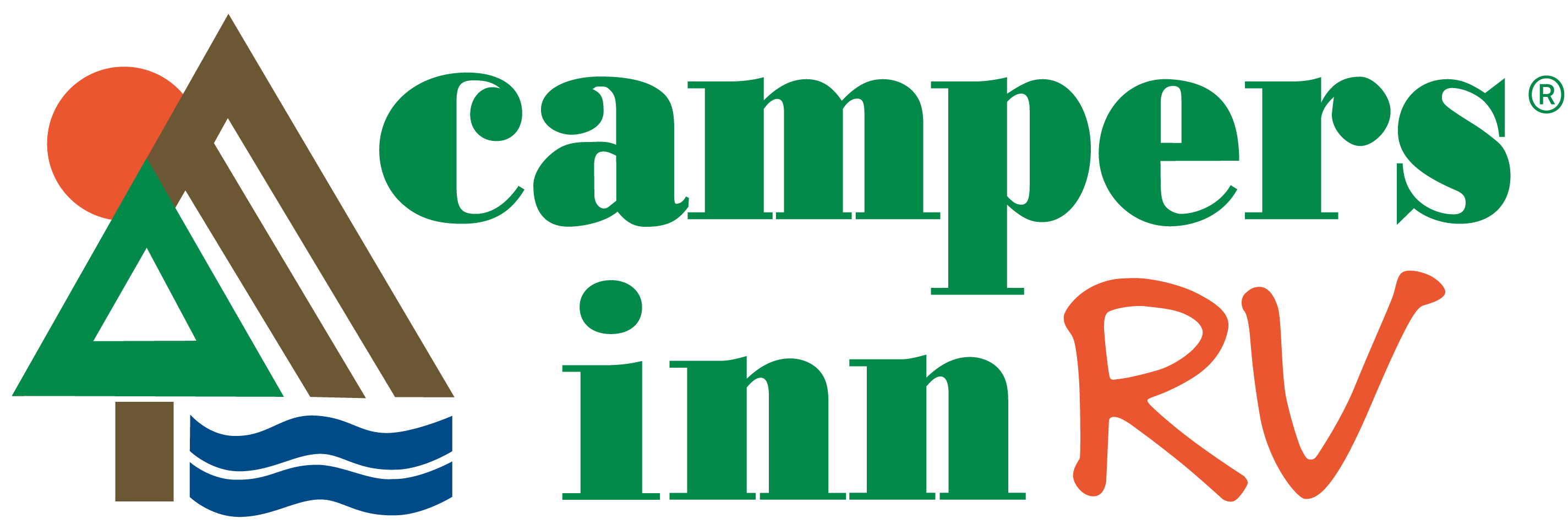
Question:
“Last year I swapped out my Group 24 deep cycle 12-volt batteries for two 6-volt deep cycle batteries. Now I’m getting my camper out of storage, and I cannot remember how the battery cables are connected. Can you help?”
Let’s first discuss why we would change 12-volt battery(s) for something with lower voltage. All RVs operate on a nominal 12-volt battery system, NOT 6-volts.
The advantage of using two (or multiples of two) 6-volt deep cycle batteries connected in series vs. two 12-volt batteries connected in parallel is simply because of the physical size and weight of the 6-volt battery “plates” which are suspended in electrolyte. Because there are fewer plates in a 6-volt battery vs a 12-volt, the plates are larger, heavier, and can store much more available electrical current. 
As an example, to compare the storage capacity, two typical Group 24 deep cycle 12-volt batteries connected in parallel may have between 120-160 Reserve Amp/Hr capacity, while two typical deep cycle 6-volt RV batteries connected in series may have from 225-265 Reserve Amp/Hr capacity, depending on the model of batteries.
So, what does all this “Series” and “Parallel” connecting of batteries mean?
Simply put, when we connect two batteries in Parallel, we connect the positive to positive, negative to negative. The load is then connected to one of the positive posts and one of the negative posts. When we connect two batteries in Series, however, we connect the negative from one battery to the positive of the other battery. The load is then connected to the remaining positive and negative posts like this:

It’s the same result if all cells were encased within one battery to make a 12-volt load. So, we have effectively created a 12-volt battery out of two 6-volt batteries. And because of the larger storage capacity, we have much more Amp/Hour capacity.
What about those battery cable connections?
If you originally had a single 12-volt battery connected to your travel trailer’s battery cables, you would simply connect the positive cable to the positive post, and the negative (grounded) cable to the negative post.
 To connect two 6-volt batteries to the existing 12-volt supply to your camper, you will connect the two batteries together first, negative to positive, then connect the positive cable from the camper to the remaining positive post, and the (grounded) negative cable to the remaining negative post.
To connect two 6-volt batteries to the existing 12-volt supply to your camper, you will connect the two batteries together first, negative to positive, then connect the positive cable from the camper to the remaining positive post, and the (grounded) negative cable to the remaining negative post.
Now, if you have more than one “set” of Two 6-volt batteries, which increases your reserve capacity even more, you would connect the “sets” together in “Parallel”. That means you will connect the batteries in sets of two, negative to positive, then treat each “set” as a larger (single) 12-volt battery connected in parallel.
In this image, set #1 would be the two batteries on the left, and set #2 would be the two batteries on the right:

When you connect multiple “sets” like this, remember to move one of the battery cables to the furthest “set” to draw all batteries equally. This allows the entire group of batteries to charge and discharge evenly, extending the life of all of the batteries.
If you have any questions regarding your battery connections, just take a picture of the batteries installed in your battery tray before any connections are made and bring it or send it to one of our service advisors. Be sure they can clearly see the battery posts (positive/negative) and how the batteries are positioned in your camper. A qualified service technician can explain exactly where each cable should be connected.
Good luck, and happy camping!
Keith Marshall Master Certified Level 4 RV Technician

.jpg?width=352&name=20241206_CORP_Social_Ask_A_Tech_16x9%20(1).jpg)

